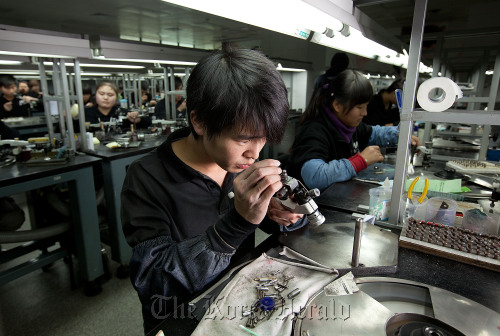 |
Workers polish diamonds in one of two rooms of polishing benches at the Guangzhou Mickey Weinstock & Co. (Bloomberg) |
Overseas diamond retailers are paying close attention to the booming diamond market in China with a view to cashing in on the country’s growing purchasing power.
Figures from the Diamond Administration of China show that the annual turnover at the Shanghai Diamond Exchange reached $2.81 trillion in 2010, an increase of 88.1 per cent from 2009. According to DAC, China is the second largest diamond-buying nation in the world. The largest is the United States. Industry experts predict sales in China will experience 15 per cent annual growth over the next few years.
De Beers, the London-based diamond-trading giant, opened its first boutique store in Beijing on May 31 with the aim of attracting wealthy customers. Other international luxury product retailers such as Cartier and Tiffany have set up flagship stores in mega cities such as Beijing and Shanghai to increase their market recognition.
Sun Fengming, the vice-president of the China Diamond Association, said diamond demand in China will continue to increase as people not only want to own a diamond but also want to know more about them.
Diamonds are increasingly in demand for wedding rings and by investors hoping to avoid the negative effects of inflation on cash.
The tremendous business opportunities in China are not just attracting the attention of international giants. Smaller players are also keeping a close eye on the market.
The diamond retailer the Carat Club, based in Malaysia, opened its first flagship store in Shanghai to sell diamonds of three carats or more.
To better meet increasing market demand, the diamond retailer with more than 50 years diamond trading experience in its home country closed its Malaysian diamond trading businesses and moved its base entirely to Shanghai two months ago.
“The Chinese market is so big and I think it is booming at the moment. I believe the Malaysian economy is not really good any way,” said Chan Boon Yong, the chief executive officer of TCC.
Yong plans to focus on selling diamonds of more than three carats. TCC said he can offer more than 10 diamonds of such quality at any one time, a feat rarely achieved in China before. Many Chinese traditionally buy large diamonds in overseas markets.
TCC plans to open more stores in Beijing and Shanghai next year.
Yong said the most important factor that makes his business different from rival giants is the ability to find something unique and to offer more choice to customers, qualities he said are not found in large stores.
“We have a long-term relationship with many international diamond suppliers and cutters. It means we can offer more choice to customers,” said Yong. “We know exactly who to call for what and where to get the right diamonds at the right prices.”
Yong claimed he could find five red diamonds at a time for customers to choose from. Red diamonds are known as the rarest stones in the world with only about 30 known to exist.
Unlike many international jewelry retailers that have opened stores in the business district, TCC chose to locate in a house in the Xuhui district of Shanghai. Yong said it would help him to create trust and friendship with consumers, which is very important for a new entrant to the market.
As the annual gross domestic product per capita climbs to $4,000 in China, the Chinese are buying more luxury goods. It was estimated by consultants Bain & Company that China will see 25 per cent year-on-year growth in the consumption of luxury goods in 2011 and could overtake Japan in the next few years.
Although diamond traders have promoted the idea that diamonds can be used as a hedge against inflation, industry experts advise caution.
“There is no platform for trading diamonds that are privately owned so it means it is hard to cash out from a diamond” said Zhang Yongtao, vice-chairman of the China Gold Association. “There are no trading services provided to private people at the SDE at present.”
Competition in the diamond sector is heating up because the number of players is increasing. Experts say that retailers should try to open more stores to increase their market share, something that will help to support growth in the sector.
By Tang Zhiha
(China Daily)








